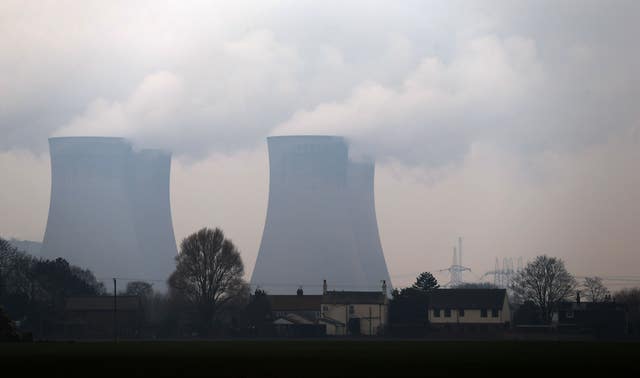
Ministers are pledging to build the world’s first low-carbon industrial sector as they detail £1 billion of spending to reduce emissions from businesses, hospitals and schools.
Business and Energy Secretary Kwasi Kwarteng is to publish the Government’s Industrial Decarbonisation Strategy on Wednesday as part of plans to reverse the climate crisis.
It was billed as a major blueprint to help reach the target of reaching net zero by 2050 that will also create 80,000 jobs across the UK over the next three decades.
But environmentalists accused the Government of giving “handouts for the fossil fuel industry”, and Labour said the plan “doesn’t deliver with nearly the scale or ambition that’s necessary”.

The £1 billion of funding was announced last year, but ministers were setting out how it will be spent in a bid to cut emissions by two-thirds in 15 years.
Some £171 million was being allocated to nine green tech projects in Scotland, Wales and northern England to study the rollout of infrastructure such as carbon capture and storage.
Local authorities across England were being allocated £932 million to fund green upgrades to public buildings including schools, hospitals and council buildings.
Mr Kwarteng said the plans, which come as the Government is under pressure over a possible new coal mine in Cumbria, will deliver a “considerable dent in the amount of carbon emissions emitting from our economy”.
“We were the first major economy to put into law our target to end our contribution to climate change, and today we’re taking steps to be the first major economy to have its own low-carbon industrial sector,” he added.

But Friends of the Earth head of science Mike Childs said “this announcement still contains handouts for the fossil fuel industry”.
“Public money will pay for carbon capture and storage for (CCS) gas-fired power stations and the production of dirty hydrogen from natural gas,” he added.
“Fossil fuel use can never be green because CCS only captures some of the carbon emissions, and there are methane leaks when gas is extracted. No ifs or buts, there should be zero support for climate-wrecking fossil fuels.”
Shadow business secretary Ed Miliband accused the Government of having “failed to deliver yet again”, as he called for a more ambitious green stimulus to decarbonise and secure jobs.
“Once again, the Government talks a big game on green but doesn’t deliver with nearly the scale or ambition that’s necessary. None of this money is new – these announcements simply allocate money already announced,” he said.
Dr Doug Parr, the chief scientist at Greenpeace UK, added: “It’s important that the Government takes a proper look at decarbonising industry but it has focussed on propping up business as usual by bolting carbon capture technologies onto fossil-fuel based industries, rather than exploring a range of routes to zero emissions.
“There may be a few areas where this looks like the only option, but to rely on it as an over-arching strategy for industry is risky. We are putting all of our eggs in the CCS basket, and no-one who understands the problems CCS has encountered on costs and performance can say with confidence that it will deliver.”


Comments: Our rules
We want our comments to be a lively and valuable part of our community - a place where readers can debate and engage with the most important local issues. The ability to comment on our stories is a privilege, not a right, however, and that privilege may be withdrawn if it is abused or misused.
Please report any comments that break our rules.
Read the rules here